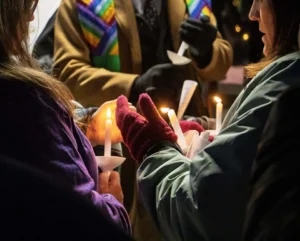Lecrae: Bridging Faith and Mainstream Culture Through Hip-Hop

Lecrae’s relationship with faith and mainstream culture has positioned him as one of the most influential voices connecting Christian belief with modern hip-hop and public discourse.
Introduction to Lecrae
Lecrae Devaughn Moore, widely known as Lecrae, stands out in the arena of hip-hop as a multifaceted artist, rapper, author, and activist. Born on October 9, 1979, in Houston, Texas, he was raised in a challenging environment that shaped his artistic expression and ideological perspectives. Lecrae’s upbringing within a single-parent household, along with various struggles including substance abuse and the challenges of growing up in a tumultuous neighborhood, informed the themes of redemption and hope found in his music.
Early influences on Lecrae included a variety of genres, which contributed to his unique sound. While hip-hop was a clear artistic choice, he also embraced elements from rock, R&B, and pop, creating a diverse music palette that appeals to a wide range of listeners. His faith journey began with a pivotal encounter with Christianity in his early twenties, significantly altering his life path and ultimately becoming the foundation of his artistry. This faith seamlessly intertwines with his lyrical content, making his work not only entertaining but also deeply reflective and thought-provoking.
Lecrae’s significance within the hip-hop genre cannot be overstated. He is often credited with paving the way for faith-based artists to gain recognition in a predominantly secular industry. His ability to marry messages of spirituality with mainstream culture has enabled him to reach an audience beyond traditional Christian music listeners. This bridge between faith and art is exemplified in his discography, through which he addresses issues such as identity, social justice, and personal struggles, making his work relatable and impactful.
Overall, Lecrae’s journey is a testament to the transformative power of music, showcasing how an artist can influence culture while remaining steadfast in their beliefs. As we delve deeper into his contributions, we will further explore how he integrates his faith with mainstream culture through music and activism.
Lecrae’s Journey in Music
Lecrae Devaughn Moore, widely known as Lecrae, began his musical journey in a distinct niche that merged his faith with artistry. Starting in the early 2000s, he initially gained recognition within the realm of Christian rap, a subgenre that allowed him to express his beliefs through powerful lyrics and compelling rhythms. His debut album, “Real Talk,” released in 2004, showcased his potential and set a solid foundation for his career.
As Lecrae honed his skills, he began to transcend the confines of Christian hip-hop. His third studio album, “Rehab,” released in 2010, marked a significant turning point in his career. The album not only resonated with faith-based audiences but also attracted attention from mainstream listeners. Notably, it debuted at number 10 on the Billboard 200, cementing Lecrae’s status as a serious contender in the wider music industry. This crossover appeal has enabled him to collaborate with numerous renowned artists, including Tasha Cobbs, NF, and even mainstream figures like Lecrae and Zaytoven.
As he continued to grow as an artist, Lecrae’s work began to reflect deeper themes and societal issues, often blending his faith with cultural commentary. The Grammy Award-winning album “Gravity,” released in 2012, further showcased his evolution, earning acclaim and recognition beyond the typical boundaries of Christian hip-hop. Lecrae’s ability to tackle real-world issues while remaining rooted in his faith has allowed him to build a multifaceted career, garnering respect from both secular and religious audiences.
By 2014, Lecrae released “Anomaly,” which debuted at number one on the Billboard 200, making him the first Christian rapper to achieve such a feat. His journey within the music industry exemplifies the intersection of faith and hip-hop culture, making him a unique figure who bridges gaps and fosters understanding through his work.
Faith and Lyrics: The Heart of Lecrae’s Music
Lecrae Devaughn Moore, widely known as Lecrae, has gained recognition not only as a talented hip-hop artist but also as a profound communicator of his Christian faith. His lyrics often reflect a sincere exploration of spiritual themes, personal experiences, and overarching societal issues that resonate with a diverse audience. At the core of Lecrae’s music lies a commitment to his beliefs, which serves as both a foundation and a driving force behind his artistry.
The themes of redemption, grace, and hope are prevalent throughout Lecrae’s discography. His willingness to tackle personal struggles—such as grappling with identity, addiction, and faith—allows listeners to connect deeply with his journey. In songs like “Church Clothes” and “All I Need Is You,” Lecrae shines a light on the complexities of faith, encouraging listeners to confront their own challenges while reinforcing the message that hope exists even in the darkest times. His honest reflections create a bridge between faith-based and mainstream culture, illustrating that the struggles faced are universal, regardless of one’s background.
Moreover, Lecrae’s ability to address pressing societal issues—including racism, poverty, and mental health—further enhances his relevance beyond the Christian music sphere. By addressing these topics, he demonstrates that faith is not merely a personal affair but a lens through which one can view and engage with the world. His lyrics inspire action, calling for empathy and understanding within communities. This nuanced approach allows Lecrae to resonate with both secular and Christian audiences, fostering a broader dialogue about faith, culture, and the human condition.
Ultimately, Lecrae’s music stands as a powerful testament to the potential of hip-hop as a means for conveying messages of faith and hope, making significant strides in bridging the gap between different cultural realms. His unique perspective encourages listeners to reflect on their beliefs while embracing the shared experiences that connect humanity.
Engaging with Mainstream Culture
Lecrae’s journey in the music industry epitomizes the delicate balance of maintaining his faith-based principles while engaging effectively with mainstream culture. As an artist rooted in Christian teachings, his approach involves a strategic navigation of various cultural landscapes, allowing him to connect authentically with a diverse array of audiences. One of the primary methods Lecrae employs to reach broader demographics is his participation in non-religious events. By performing at festivals and music venues that cater to a general audience, he opens the door for conversations surrounding faith that may not typically occur in traditional church settings.
Furthermore, Lecrae frequently collaborates with secular artists, which serves to bridge the gap between genres and ideologies. These partnerships not only introduce his music to new listeners but also allow for a fusion of artistic styles—melding hip-hop with different genres, making his message more accessible to those outside of the Christian sphere. Such collaborations have produced hit songs that resonate with both believers and non-believers, demonstrating that faith-based messages can find footing in popular music without diluting their essence.
Throughout his career, Lecrae has been immensely thoughtful about maintaining authenticity. This is particularly vital in an industry where artists often face pressure to compromise their values for commercial success. Lecrae skillfully upholds his identity by sharing personal narratives that reflect his spiritual journey and struggles, thereby fostering relatability. His genuine storytelling invites listeners from all walks of life to engage with his music, transcending cultural boundaries. This intentionality reinforces the idea that hip-hop can serve as a powerful platform for not just entertainment, but also for significant dialogue around faith and personal growth.
Activism and Social Issues
Lecrae has carved out a significant role as an activist, using his platform to address social issues that resonate deeply with his audience. His commitment to social justice is evident through various initiatives aimed at raising awareness and fostering community development. As a prominent figure in hip-hop, Lecrae leverages his influence to shine a light on pressing societal challenges, particularly those affecting marginalized communities.
One of the pillars of Lecrae’s activism is mental health awareness. He openly discusses his personal struggles with mental health, breaking the stigma that often surrounds these topics. By sharing his experiences, he encourages others to seek help and support, emphasizing that it is acceptable to talk about mental health challenges. This advocacy reinforces the idea that mental health is just as critical as physical health, especially in high-pressure environments faced by artists and everyday individuals alike.
In addition to mental health, Lecrae is deeply invested in community development. He has partnered with various organizations to promote education and provide resources to underprivileged youth, fostering hope and opportunity in settings where it is often lacking. Projects such as mentorship programs and scholarship funds reflect his commitment to empowering the next generation. His ability to connect with diverse audiences allows him to mobilize support for these initiatives, turning his music into a vehicle for change.
Lecrae’s activism demonstrates the profound impact that artists can have on social issues. Through his efforts, he advocates for a more just society while addressing the needs of his community. By intertwining his music with these causes, he effectively raises awareness and drives meaningful discourse, paving the way for positive change in the world.
Books and Written Works
Lecrae, a prominent figure in the world of hip-hop, has not only made a significant impact through his music but has also shared his perspectives and experiences through various written works. His books serve as an intimate window into his life, faith, and the philosophy that drives his artistic expression. One of his notable works, “Unashamed,” delves deeply into his personal journey, chronicling his struggles and triumphs while exploring the complexities of faith in an often challenging world.
Within the pages of “Unashamed,” Lecrae addresses themes of identity, redemption, and the challenges of maintaining one’s beliefs within mainstream culture. He candidly recounts the trials he faced, including moments of self-doubt and the pressures of societal expectations. This openness not only resonates with readers but also complements his musical endeavors, which frequently tackle similar themes. Lecrae’s writing bridges the gap between the realms of faith and culture by inviting readers to reflect on their values and experiences, and how these may intersect with the broader narrative of contemporary society.
In addition to “Unashamed,” Lecrae has authored “I Am Restored,” where he expands on his exploration of faith and healing. This work focuses on the importance of resilience and renewal, offering practical guidance grounded in his own life lessons. Both books illustrate Lecrae’s ability to articulate his beliefs in a manner that appeals to a diverse audience, effectively drawing connections between his life as a Christian artist and the wider cultural landscape. His literary contributions complement his musical legacy, reinforcing his role as a thought leader who continually strives to inspire others through both words and melodies.
The Impact of Lecrae’s Work
Lecrae’s influence on the music industry, particularly at the intersection of faith and mainstream culture, cannot be overstated. As a trailblazer in Christian hip-hop, Lecrae has managed to carve a niche that resonates with diverse audiences, both within and beyond the church community. His ability to address complex issues such as identity, faith, and societal challenges through a hip-hop lens has sparked a movement, inspiring young artists to explore similarly relevant themes in their work.
Feedback from fans illustrates the profound impact Lecrae’s music has had. Many listeners report that his lyrics have provided solace, guidance, and a sense of belonging, especially for those grappling with their faith in a contemporary world. Testimonials frequently highlight how his music offers encouragement and fosters a deeper understanding of spirituality, embodying the struggles and triumphs of the human experience. This emotional connection is crucial in establishing Lecrae not just as an artist, but as a cultural influencer.
Critics in the music industry acknowledge Lecrae’s significance as well. Music experts often commend him for pushing the boundaries of traditional gospel music, introducing innovative sounds that appeal to broader audiences. His collaborations with mainstream artists have broadened the reach of Christian hip-hop, facilitating a dialogue that bridges the gap between faith-based and secular music. Through these collaborations, Lecrae not only showcases his versatility as an artist but also offers a unique platform for discussions about faith in different contexts.
The emergence of a new generation of artists inspired by Lecrae’s work further solidifies his impact. Many contemporary musicians are now integrating themes of faith into various genres, signaling a shift in the music landscape that embraces spiritual expression alongside artistic innovation. It is clear that Lecrae’s contributions transcend entertainment, serving as a catalyst for cultural conversation and artistic exploration.
Challenges and Controversies
Lecrae, a prominent figure in the hip-hop genre, has found himself navigating a complex landscape filled with challenges and controversies throughout his illustrious career. As an artist who strives to bridge the gaps between faith and mainstream culture, Lecrae has faced significant scrutiny from both Christian and secular communities. Each group has their own expectations and standards, often leading to harsh criticisms of his choices and lyrical content.
From the outset, Lecrae’s decision to infuse his faith-driven messages into his music positioned him as a target for both supporters and detractors. Within the Christian community, some have criticized him for moving towards a more secular sound, suggesting that he has compromised his beliefs in exchange for broader appeal. This criticism can be challenging for an artist whose primary aim is to convey a message of hope and redemption through his work.
Conversely, members of the secular community have occasionally dismissed Lecrae as a mere Christian artist, arguing that his faith limits his appeal and authenticity. These challenges highlight the duality Lecrae faces: he must stay true to his Christian roots while simultaneously appealing to a broad audience craving depth and relevance in hip-hop. Lecrae has responded to these challenges with resilience, often engaging in open dialogues about the nature of his work and his mission to bridge cultural divides. His authenticity shines through his willingness to address difficult topics, making him a relatable figure in both worlds.
By navigating these complex dynamics, Lecrae has shown a commitment to his art form and the messages he believes in. Ultimately, he remains determined not only to entertain but also to inspire others, further solidifying his role as a transformational figure in hip-hop who seeks to unify through music.
Conclusion and Future Aspirations
Lecrae has undeniably made a significant impact on the hip-hop genre, not only through his music but also through his unwavering commitment to integrating faith within mainstream culture. His unique ability to blend powerful lyrics with profound messages of hope and resilience has redefined what it means to be an artist in contemporary society. As he navigates the complexities of fame and faith, Lecrae continually pushes boundaries, encouraging listeners to explore deeper truths while enjoying the art form they love. This commitment has fostered a new wave of artists and fans who appreciate authenticity and conviction in hip-hop.
The trajectory of Lecrae’s career exemplifies his dedication to bridging the gap between his faith and the wider cultural landscape. His activism, which addresses critical societal issues such as social justice, mental health, and community empowerment, marks him as a significant figure not only in music but in civil discourse. As he moves forward, Lecrae continues to reflect on his role within both the Christian community and the broader music industry. His aspiration to educate and inspire the next generation remains at the forefront of his artistic endeavors.
Looking ahead, Lecrae has a variety of projects on the horizon that promise to further his mission of merging faith with mainstream consciousness. His upcoming album, anticipated to release soon, is expected to feature an eclectic mix of sounds while delivering poignant messages relevant to today’s society. Furthermore, he is exploring additional avenues of expression, including collaborations with diverse artists and participation in community initiatives aimed at fostering unity and understanding among different cultural groups. Lecrae’s vision for the future is clear: to remain a beacon of hope and a voice of change, continually inspiring others through the power of music and faith.













1 thought on “Lecrae: Bridging Faith and Mainstream Culture Through Hip-Hop”